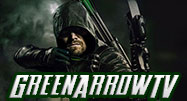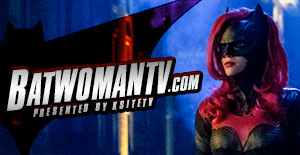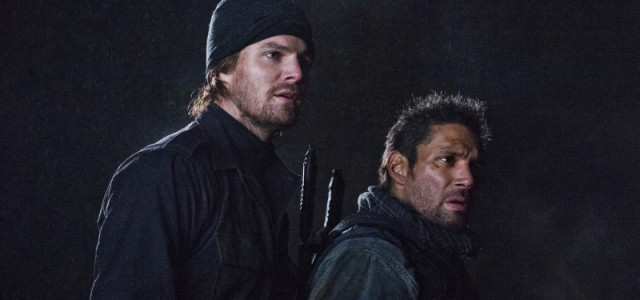
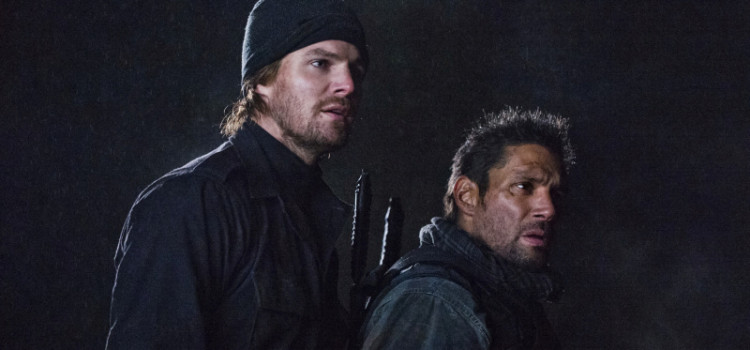
Arrow #1.18: ‘Salvation’ Recap & Review
Recaps & Reviews March 30, 2013 Matt Tucker

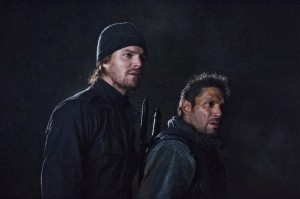 Summary: A surprisingly emotional episode lends more weight to a rather standard hero/vigilante trope.
Summary: A surprisingly emotional episode lends more weight to a rather standard hero/vigilante trope.
If you have not seen this episode yet and do not wish to be spoiled, do not continue reading!
Recap
A vigilante, inspired both by the murder of his wife and Oliver’s hooded campaign, attempts to make the Glades a better place by kidnapping those he feels guilty of crimes, forcing them to publicly admit to their discretions via an online video feed, and then executing them. Oliver attempts to stop him, but the stakes are raised and he’s running out of time as Roy Harper becomes the next victim of this “Savior.”
For a full recap of this episode, visit our handy episode guide.
Review
One of the key aspects of the series has been to show Oliver’s journey from vigilante to becoming a hero. While there has been significant growth on his part this season, both as a crimefighter and as a damaged man, the show does the right thing by not making it a straight line, an simple progression. There are moments in life, events that occur, that cause near-instantaneous change in behavior, in attitude, in outlook. More often than not, though, changes in life and growth are a jagged pattern, full of as many reverses as there are steps forward.
With Oliver, he seems to fluctuate in his methods as “the Hood,” at times appearing to use deadly force without reservation, and others where he’s more considerate of his actions and their impact. Some might look at this as hypocritical when he takes on mentorship of someone like Helena and chides her for using deadly force at all. Yet, it reads as very human because it doesn’t show an Oliver who is just lightswitched from the man who came back from the island with a very specific goal in his mind.
While we’ve already had elements of the struggle addressed with Helena’s arc, even appearing just last week, and the public’s initial views of the Dark Archer’s actions back in “Year’s End,” the show presents the first true challenge to Oliver’s vigilantism this week. It’s a fairly rote story of a man taking this concept to the extreme and feeling justified for his actions by personal tragedy and the existence of someone like Oliver’s alter ego. Unfortunately, it also doesn’t offer Oliver any kind of insight into his own practice, at least none that he takes away from it, making it somewhat ineffectual.
That doesn’t mean the story is without consequence or effect. In fact, quite the opposite. In specific, both Felicity Smoak (Emily Bett Rickards) and Roy Harper (Colton Haynes) are unquestionably altered by their experiences with “the Savior.” Rickards and Haynes shine in this surprisingly emotional episode, as Felicity is exposed to the dark realities of this crusade she has joined and Roy begins his first steps toward atonement and redemption for his past. One of the strongest sequences of the series is the frantic chase by Oliver to stop the Savior from killing the ADA, guided by Felicity, only to come up short. It’s that moment where Felicity’s soul is crushed and she recoils from the computer that really sells it, and continues to solidify how much the show has stepped up in terms of emotional connection for the characters and the audience.
The one piece of Roy’s story this chapter that doesn’t hold up as well to scrutiny is that he’s involved with the Savior at all. No, it’s not a stretch that this new vigilante would be targeting criminals in the Glades. And the one tenuous connection to the Savior is the fact that the guy’s wife was killed by “gangbangers,” of which they’re making a strong effort to establish that Roy is one of them. It plays, though, like a plot convenience, especially as the two previous victims were rather prominent. It likely would’ve made more sense if there had been more victims of the Savior’s reign. That doesn’t diminish at all the event as catalyst for Roy to change his life, and obviously to send him down a path similar to his comic counterpart where he follows in his rescuer’s footsteps. Or is that bow-and-arrow-steps? Haynes’ chemistry with Willa Holland and his presence as a broken character who would fit right in with Team Arrow prove he’ll be an excellent addition as a series regular starting next season.
Interestingly, though Oliver seems to take nothing from the Savior’s narrative in relation to his archer antics, it’s the impact to both Felicity and Roy — by way of Thea — that cuts to his core. Even after opening himself up to a life and love with McKenna, Oliver found it easy in her absence to retreat back into the colder, focused version of himself that spun out of the island. How touching it was to see him reject that in the face of these revelations and connections in others close to his life. It’s also worth noting that it was Laurel with whom he took that first step. Amell continues his string of strong performances, selling his rage and his determination well, as well as his lack of tact and strategy during the island flashbacks that cost he and Wilson their advantage (and possibly Yao Fei) but gained them a new ally in Shado. It was the soft moments, though, where he really stood out. The hand to Felicity’s shoulder and the hold and delivery of his “I don’t want to be on an island anymore” line to Katie Cassidy’s Laurel was particular standouts.
As for Laurel and Cassidy, the Lance storyline reaches a meaningful and effective point … only to end quickly. No, it’s not likely the end of this thread, merely a roadblock, but it’s disappointing that just as it was coalescing into something they drop it for now. The connections between Paul Blackthorne’s Quentin and Alex Kingston’s Dinah were vivid and the heartbreak at Laurel’s discovery that the girl in the picture wasn’t Sara was palpable. Kingston finally gets a moment to add some meat to the role and her recounting of the last day she saw Sara alive and how she could’ve stopped her was wrenching. Just when we get a taste, though, they’re shuffling her out the door to Central City. They’ve re-established the connection between mother and daughter — and in many ways this feels more authentic than purposefully dragging things out — but in a certain sense they’ve robbed Laurel of one of her main character motivations. As she’s but a sketch at this point, it’s hard to see how this does any favors. Cassidy, though, did a good job throughout and the showrunners would do well to start finding other things for her to do instead of just being the love interest.
Though there seems to be a streamlining to the storytelling that has improved the narrative drive of each episode on this back end of the run this season, it also feels like there are many threads to keep track of each episode. It’s not overwhelming in the least and actually flows together fairly well as it all feels pointed in the same direction. The final thread this episode is the “Tempest” (or Undertaking) group and Malcolm’s efforts to weed out the culprit who put the hit out on him. Sadly, by setting up the conspiring partnership between Moira (Susanna Thompson) and Frank Chen (Chin Han), it was fairly obvious that Chen was going to be left with his cheese out in the wind. It’s intriguing to see just how in over her head Moira is, considering how she was set up at the start of the season to be quite devious and quite involved with the dark side of things in Starling City. She’s really scrambling with the choices she’s made and trying everything she can to save the lives of those in her family. Unfortunately, this now looks like its all set-up for Moira’s possible demise, to answer for the literal blood on her hands. No matter the resolution, Thompson continues to hit all the right notes and her breakdown in the car following Chen’s assassination by the Dark Archer is certainly no exception.
‘Salvation’ is a strong episode built on a fairly standard premise for a hero’s story, the distorted funhouse mirror version of his efforts. It’s told well and certainly shot well, which steps it above the main premise. Though, it is elevated by the performances and the emotional stakes for all involved. In a story about consequences of one’s actions, it is the consequences and the responses to those that make this installment worth telling.
Odds & Ends
- In a similar vein to Andrew Dunbar as Firefly in “Burned,” guest star Christopher Redman has the thankless job of making the Savior believeable within the fabric of the show. He does fine work with a part that’s really less about being an indelible character and more about playing stimulus for the events going on. It says much that the show can succeed well with just playing out events rather than having to trump up this regular man who has snapped into something more.
- Dinah Lance’s line about returning to Central City in a flash was an obvious reference to that DC location’s most prominent denizen.
- They need to find more for Diggle to do. Though the triptych relationship of Team Arrow works and works quite well, one can’t help but feel that Diggle is somewhat marginalized now with Felicity on-board. Yes, he’s the heart and the reason in the operation, but it’s beginning to feel like he’s just sitting around while Oliver “hoods up” and Felicity works the tech angle. Setting up the reappearance of Lawson should have Diggle working his own angles.
- Speaking of the threesome, it’s nice to see a similar team structure being built on the island. It also sets up the anticipation of what’s going to happen to both Wilson and Shado during the interceding 4 years on the island that leaves Oliver alone and turned into the hardened person who comes back to Starling City.
- Oddly, after Felicity is understandably shaken following the death of ADA Carnahan, she mentions that she’d never seen anyone die before. Yet, she’d watched John Nickel get killed in the same fashion earlier in the episode. Give the benefit of the doubt over her grief, but it seemed like a rather strange oversight by the writers.
- Unsure if it was intentional, but Dinah’s necklace seemed to loosely recall Black Canary’s choker and her trademark fishnets.
A SECOND OPINION
by Derek Gayle
“Salvation” is strong effort for the show. There’s not much revolutionary going in—plenty of shows have done the Judge/Jury/Executioner story—but it builds up the tension appropriately, and plays off of the characters’ own emotional states.
The Felicity/Diggle/Oliver dynamic is very well used here, better than its initial spotlight in “Dodger.” Diggle didn’t get a whole lot to do this time in terms of the mission, but even when he’s not kicking butt, he’s something of the “heart” of the team. David Ramsey plays up some of the cheesy, comedic material (like forcing Oliver to get a burger) naturally, adding to the overall lightness. Meanwhile, Felicity’s internal crisis as she becomes more integrated into the darker world of vigilantism was quite well-played.
Katie Cassidy was significantly better than usual this week. Laurel might not be the proto-Black Canary we want her to be, but she does have the talent to draw us in when necessary; it’s just a matter of getting the material for it. Alex Kingston also did better this week with her more emotional material, but she still seems like a waste of potential if this is all we see of her for a while.
It’s quite a feat how much Roy has already been fleshed out in his few appearances. Colton Hayes and Willa Holland continue to have instant chemistry, and both handled the high-stakes emotion quite well this week. Roy is already proving to be an interesting character, and in tune with the fast pace this show usually has, he’s already becoming integrated into the larger mythology.
One of the strongest points of this back half has been how important Oliver’s murders in the first half were. The fact that he killed so mercilessly in the early episodes made him nigh unlikable at times, but it’s become a valuable part of this show’s arc now. The concept of differentiating what justifies murder is a big part of this episode, nicely pointed out both by the Savior, and by Diggle and Felicity’s (very funny) observation about Oliver’s initial reaction to the kidnapping. The fact that his immediate reaction to the potential of a copycat vigilante is a good character moment, pointing out one of Oliver’s bigger flaws: his inherent distrust of people. It ends up being justified here, since the Savior is plenty crazy, but it’s possible that his lack of optimism when it comes to other vigilantes might lead to his downfall at some point.
This also plays into Oliver’s arc about “not wanting to be on an island anymore,” which is used effectively. Like I mentioned last week, Amell does sufficiently better work when he’s allowed to open up and exude his natural charisma, and it seems like this will be a permanent development. Also, it’s worth noting that the island flashback has a “team” growing with Oliver, Slade and Shado, just as present-Oliver is inviting more people into his life. It isn’t a brilliant thematic tie, but it’s a worthwhile effort to tie in the flashback to the current plot.
Susanna Thompson also made a big impact in her few scenes, as Moira’s subterfuge is quickly coming to a head. The death wasn’t much a surprise, but a brief glimpse at the Dark Archer and Moira’s reaction sold the moments. Overall, with few flaws, “Salvation” makes a valiant effort to continue the upward slope the back half of this season has been on, even if it isn’t quite as memorable as some recent episodes.
Matt Tucker Editor/Senior Writer/Reviewer
Matt Tucker is a stage and film actor, writer, Seattleite, comics nerd, sports fan, and aspiring person. Someday, he’ll be a real boy. He's an editor and senior writer for KSiteTV network (GreenArrowTV, DaredevilTV) and the sports blogs Sonics Rising and Cascadia Sports Network. Follow him on Twitter at @MattBCTucker or @TuckerOnSports
Arrow Reunion Picket Set For August 11
News Aug 4, 2023
Stephen Amell Is Returning To The Arrowverse!
News Jan 8, 2023
Happy Arrowversary!
News Oct 10, 2022
Mia Queen Returns For The CW’s “Armageddon”
News Aug 25, 2021
Arrow Season 8 Blu-ray & DVD Coming April 28
News Feb 5, 2020
End of an Arrow: Thoughts on the Series & Finale
News Jan 28, 2020
